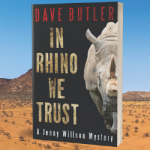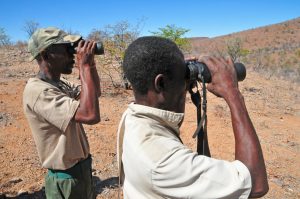In what may be a first for an ATTA Adventure Travel World Summit, it was during the 2013 ATWS in Namibia that I found the inspiration for my third novel -- ‘In Rhino We Trust’ (Dundurn Press, 2019).

That year, our pre-summit adventure took us north from Windhoek to the dry savannah in and around Etosha National Park. We visited craft fairs, camped at a royal homestead, interacted with local choirs, and spent hours watching wildlife. We saw zebra, oryx, giraffe, springbok, cheetah and many others.
After visiting a third consecutive eco-lodge, I began to appreciate the critical role that adventure travel played not only in the sustainability of rural communities such as Outjo, Kamanjab and Opuwo, but in Namibia’s unique network of community conservancies (which cover 19.5% of its land-base).
Grootberg Lodge, in the Kunene Region, is an inspiring example of that inextricable link between adventure travel and conservation, so much so that it’s the setting for several scenes in my novel (under a fictitious name). The lodge is wholly owned by ≠Khoadi-//Hôas Conservancy and gives a percentage of its profits to support the conservancy’s work. In normal times, this sustainable revenue stream pays the salaries of management staff and game guards, office and vehicle expenses, and community benefits such as student bursaries in schools, diesel to pump water for livestock and wildlife, soup kitchens for pensioners, and repairs to infrastructure damaged by elephants.
Is that direct link between adventure travel and conservation making a difference? Absolutely. The black rhino population in Namibia, for example, is the largest in the world. Although rhinos are increasingly threatened by poaching in other southern African countries, the Namibian government can now translocate black rhinos out of national parks into the safe keeping of these community conservancies. And it’s largely because of the benefits from adventure travel.
In fact, characters in my novel were inspired by the rhino rangers I met and hiked with from Save the Rhino Trust Namibia. Many are former poachers, who now are in the field day after day, following and observing rhinos, protecting rather than shooting them. Instead of being vilified in their communities, these men (and a few women) have uniforms, good salaries, equipment, prestige … and most important, self-respect.

Through my main protagonist in the novel, I explore the complexities of poaching in sub-Saharan Africa, from shadowy international buyers and the police and wildlife officers trying to stop them, to the men who poach rhinos, often less out of greed than out of poverty. In the absence of alternatives, they must feed their families. That doesn’t make what they do right, but it does show the power of the alternatives that adventure tourism can and does provide.
In my mind, this quote is a perfect summary of what leaders and citizens of Namibia have come to understand:
“A dead rhino will feed a family for a week. A live rhino will feed a family for a lifetime.”
Once I decided to set my third novel in Namibia, I returned there in 2018 to see it with a writer’s eye. I interviewed ecolodge owners and government staff, and I connected with a wildlife officer and his service dog, who is trained to find buried rhino horns (poachers bury them, then come back later when they have a buyer … like an in-ground savings account). I visited community conservancies, and kept notes on distances, vegetation, temperatures, and the way the light played on the landscape. As any writer knows, details are crucial, even in fiction. Every meeting, every interview, every chance encounter, was grist for the writing mill.Unfortunately, things have changed dramatically since I was last in Namibia. Like in most destinations, COVID-19 is devastating the country’s visitor economy. With adventure travel all but stopped, revenues from lodges and tours have slowed to a trickle, while salaries for rhino rangers and ecolodge workers are at risk of disappearing.
But there is hope. If you choose to read ‘In Rhino We Trust’ (available at bookstores everywhere, and on every major e-book platform), I hope it inspires you to support initiatives like the Adventure Travel Conservation Fund or organizations such as Save the Rhino Trust or Tusk.org.
With adventure travel at a stand-still, these initiatives are making a difference -- for rural people, and for the wildlife of the country. With your help, they will keep doing so until we can safely return to Namibia.
“If you want to go somewhere fast, go alone. If you want to go far, go together.”
African proverb
